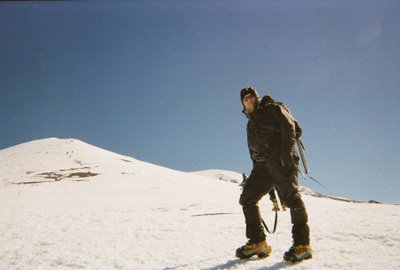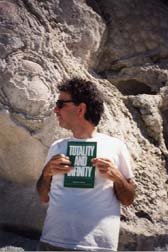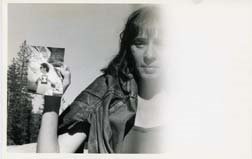Phatic Gamble of the Lyric
Occasionally the idea of an A Tonalist anthology occurs to me. Luckily, one already exists hidden within the pages of Bay Poetics. One of the definitive pieces in this anthology-within-an-anthology is the section taken from Taylor Brady’s Yesterday’s News, (originally published in Leslie Scalapino’s second War and Peace anthology.) Every word in this much anthologized piece seems to drill down into an alternative universe of possibilities. (“cadence,” “within,” “incision,” “vacule,” “inequality”) The ambiguities accrue to assert and undermine the propositions even as they are made. One is left feeling simultaneously enabled, understood, outflanked and encouraged.
Taylor brings up the vexed question of lyric in a way that acknowledges a millienium’s worth of ennui on the subject yet manages to interest us anyway. As Suzanne Stein comments in “Fugitive State,” in the most recent BOTH BOTH, “Time’s run away with me./Is this a Lyric?/Stop asking questions, stop asking, stop.”
But the question of lyric remains and stands in for the question of genre at all. Taylor’s text extends the already wide territory of what might be considered poetry. It stands in the no-man’s land between lyric, essay and the void.

Thrillingly, these considerations, among many others, continue in Taylor’s luscious new book Occupational Treatment just out this second from Atelos:
From “Broadcast for Dead Television,” "Survey Markers," Occupational Treatment

Occasionally the idea of an A Tonalist anthology occurs to me. Luckily, one already exists hidden within the pages of Bay Poetics. One of the definitive pieces in this anthology-within-an-anthology is the section taken from Taylor Brady’s Yesterday’s News, (originally published in Leslie Scalapino’s second War and Peace anthology.) Every word in this much anthologized piece seems to drill down into an alternative universe of possibilities. (“cadence,” “within,” “incision,” “vacule,” “inequality”) The ambiguities accrue to assert and undermine the propositions even as they are made. One is left feeling simultaneously enabled, understood, outflanked and encouraged.
Taylor brings up the vexed question of lyric in a way that acknowledges a millienium’s worth of ennui on the subject yet manages to interest us anyway. As Suzanne Stein comments in “Fugitive State,” in the most recent BOTH BOTH, “Time’s run away with me./Is this a Lyric?/Stop asking questions, stop asking, stop.”
But the question of lyric remains and stands in for the question of genre at all. Taylor’s text extends the already wide territory of what might be considered poetry. It stands in the no-man’s land between lyric, essay and the void.

Taylor Brady on Mt. Shasta
From “They Store It Up”
(slight return)
--- notes around lines by George Oppen –
Lyric, because its fundamental is address to a world from a place within the world, and because neither of these can be known or given in advance. Without some authorizing cadence the clashing overtones cannot resolve, and an angular space of blank incision opens us.
Anything but a “return to the lyric” – this is the cadence itself, whose recuperative translation from hazarded address to the metalanguages of settlement has always demanded such a pre-emptive return. To parlay the phatic gamble of the lyric into the general clamor and desperation of intra-Imperial counter-communication, is to build a language that does not return.
Something else is there, if only.
Its emptiness, reflected back on itself as an inequality, hollows out the contours of a space in which others might remain alive. This space, formed in the vacuole or gap in temporality that encloses lyric address, must be pried loose from the privileged exemption to history that it has too often claimed for itself, to become instead a locus for what is unresolved in historical progression, the wrenched standpoint of a contradiction.
(Place of birdsong in Dolphy’s music, as an early field guide).
I think my poetry has arrived at a constricted moment where the lyric, far from returning, is finally possible. I think it is necessary to risk an inability to speak if I am to find whether anything can still be said.
Thrillingly, these considerations, among many others, continue in Taylor’s luscious new book Occupational Treatment just out this second from Atelos:
He will lean into your space a bit, with lyric
anxiety almost real. A gold standard.
A golden standard will get planted on the walls,
fluttering foil, focusing the eyes up,
away from all the bleeding trying
to get in on the ground floor. A standard
sort of horizon. Not a poem but this
painting, this focus: closed and padlocked
metal door heating up from inside
in the fire. Cliffhanger. His badly broken
leg. Episodes. His thirty minute
interval evacuate him. Oil
slicks. A shimmering sort of series.
From “Broadcast for Dead Television,” "Survey Markers," Occupational Treatment






